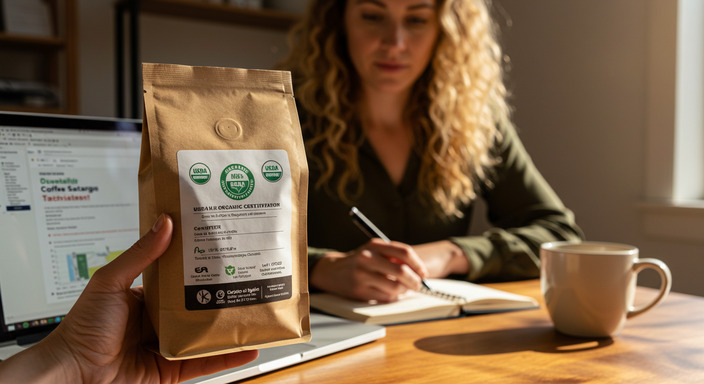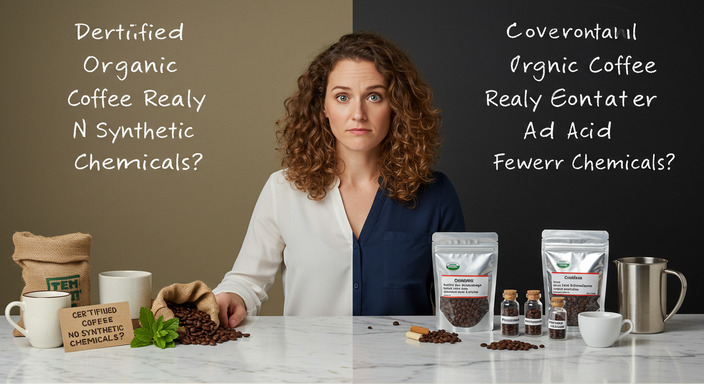
What Standards Are Required to Be Labeled Organic?

Table of Contents
ToggleIntroduction to Organic Labeling
What Does “Organic” Truly Mean?
When you see the term organic on a product, it’s more than just a buzzword. Organic refers to how agricultural products like coffee are grown and processed. Organic farming prioritizes natural methods, avoiding synthetic pesticides, genetically modified organisms (GMOs), and chemical fertilizers. Instead, it focuses on sustainable practices that nurture the soil, conserve water, and support biodiversity. For coffee to be labeled organic, it must meet strict standards set by organizations like the USDA (United States Department of Agriculture). These standards ensure that every step—from seed to cup—aligns with environmentally responsible practices.
Why Organic Labeling Matters for Consumers
Choosing organic isn’t just about personal health; it’s about making a positive impact on the planet and the people who grow our coffee. Here’s why organic labeling is important:
- Health Benefits: Organic coffee is free from harmful synthetic chemicals, reducing your exposure to pesticides and other toxins.
- Environmental Protection: Organic farming promotes healthier ecosystems by reducing pollution, conserving water, and supporting soil fertility.
- Ethical Choices: Organic certification often ensures fair wages and better working conditions for farmers, empowering communities.
When you choose organic, you’re not just drinking a cup of coffee—you’re supporting a sustainable, ethical, and healthier future for all.
USDA Organic Certification
When you see the USDA Organic seal on a product, it’s more than just a label—it’s a promise. This certification ensures that the coffee you’re drinking meets strict standards set by the United States Department of Agriculture (USDA). But what exactly does it mean for coffee to be organic? Let’s break it down.
Overview of USDA Organic Standards
The USDA Organic standards are designed to promote sustainable farming practices, protect the environment, and ensure transparency for consumers. For coffee to be certified organic, it must meet specific criteria at every stage of production—from the soil it’s grown in to the way it’s processed and packaged.
Here’s what the USDA Organic seal guarantees:
- The coffee is grown without the use of synthetic pesticides, herbicides, or fertilizers.
- Farming practices prioritize soil health and biodiversity.
- Genetically modified organisms (GMOs) are strictly prohibited.
- Processing methods avoid synthetic chemicals and maintain the integrity of the organic product.
Key Requirements for Organic Farming
Organic farming is a holistic approach that goes beyond simply avoiding synthetic chemicals. To meet USDA Organic standards, coffee farmers must adhere to a set of rigorous practices:
- Soil Health: Farmers must use natural methods to enrich the soil, such as composting, crop rotation, and cover cropping. This ensures the land remains fertile for future generations.
- Pest Management: Instead of relying on synthetic pesticides, organic farmers use natural pest control methods, like introducing beneficial insects or using plant-based repellents.
- Water Conservation: Organic farming emphasizes sustainable water use, reducing waste and protecting local water sources from contamination.
- Fair Labor Practices: While not directly part of the USDA Organic standards, many organic coffee farms also prioritize fair wages and safe working conditions for their workers.
By choosing USDA Organic coffee, you’re supporting farming practices that are better for the planet, healthier for you, and more ethical for the farmers who grow it. It’s a small choice that makes a big difference.
Organic Coffee Production Standards
Prohibited Substances in Organic Coffee Farming
When it comes to organic coffee farming, the use of synthetic chemicals is strictly prohibited. This means no synthetic pesticides, herbicides, or fertilizers can be used in the cultivation process. Instead, organic coffee farmers rely on natural methods to manage pests and enrich the soil. For example, composting, crop rotation, and natural predators like ladybugs are commonly used to maintain a healthy ecosystem. Additionally, genetically modified organisms (GMOs) are not allowed in organic coffee production, ensuring that the coffee beans remain pure and unaltered.
Sustainable Farming Practices for Organic Coffee
Sustainability is at the heart of organic coffee farming. Farmers adopt practices that protect the environment, conserve natural resources, and promote biodiversity. Here are some key sustainable practices:
- Shade-Grown Coffee: Many organic coffee farms grow their beans under the canopy of trees. This method not only provides a natural habitat for wildlife but also helps maintain soil fertility and reduce the need for irrigation.
- Water Conservation: Organic coffee farms often implement water-saving techniques, such as rainwater harvesting and drip irrigation, to minimize water usage.
- Soil Health: Instead of using synthetic fertilizers, organic farmers focus on building healthy soil through composting, mulching, and planting cover crops. This enhances soil structure and fertility over time.
- Fair Labor Practices: Many organic coffee farms also prioritize fair wages and safe working conditions for their workers, ensuring ethical treatment throughout the supply chain.
By adhering to these standards, organic coffee production not only benefits the environment but also produces coffee that is healthier for consumers and more sustainable for the planet.
Benefits of Choosing Organic
Health Advantages of Organic Coffee
Choosing organic coffee isn’t just about a better cup—it’s about a healthier you. Organic coffee is grown without synthetic pesticides, herbicides, or fertilizers, meaning you’re sipping a brew free from harmful chemicals. These substances, often used in conventional coffee farming, can leave residues that may impact your health over time. By choosing organic, you’re reducing your exposure to these toxins.
Additionally, organic coffee often contains higher levels of antioxidants, which are compounds known to fight inflammation and support overall well-being. Since organic farming practices focus on soil health, the beans tend to be richer in nutrients, offering a more robust flavor and potential health benefits.
Environmental Benefits
When you choose organic coffee, you’re also making a positive impact on the planet. Organic farming practices prioritize sustainability by avoiding synthetic chemicals that can pollute soil, water, and air. Instead, farmers use natural methods like composting, crop rotation, and shade-grown techniques. These practices not only maintain soil fertility but also support biodiversity, providing habitats for birds, insects, and other wildlife.
Shade-grown organic coffee, in particular, helps preserve forests by reducing the need for deforestation. This method also combats climate change by sequestering carbon dioxide, making your morning cup a small but meaningful act of environmental stewardship.
Ethical Considerations
Organic coffee often comes with a commitment to fair trade and ethical sourcing. Many organic coffee producers ensure fair wages and safe working conditions for farmers, empowering communities and promoting social equity. By opting for organic, you’re supporting a system that values both people and the planet.
Moreover, organic certification standards often require transparency in the supply chain, giving you confidence that your coffee is produced responsibly. This means your purchase helps sustain livelihoods while encouraging ethical farming practices worldwide.
How to Identify Truly Organic Products
Recognizing USDA Organic Labels
When shopping for organic products, especially coffee, the USDA Organic label is your most reliable indicator of authenticity. Products bearing this seal have met strict standards set by the United States Department of Agriculture. These standards ensure that the product is at least 95% organic, free from synthetic pesticides, artificial fertilizers, and genetically modified organisms (GMOs). Look for labels such as:
- 100% Organic – Indicates that all ingredients are organic.
- Organic – Means at least 95% of the ingredients are organic.
- Made with Organic Ingredients – Contains at least 70% organic ingredients.
Remember, only products labeled “100% Organic” or “Organic” can display the USDA Organic seal.
Tips for Verifying Organic Claims
While the USDA Organic label is a great starting point, conscious consumers should go a step further to ensure they’re purchasing truly organic products. Here are some practical tips to help you verify organic claims:
- Check the Certification – Look for the certifying agent’s name on the packaging. Reputable certifiers include CCOF, Oregon Tilth, and QAI.
- Research the Brand – Visit the brand’s website to learn about their sourcing practices and certifications.
- Read Ingredient Lists – Even if a product is labeled organic, reviewing the ingredient list can help you avoid unwanted additives.
- Support Local Farmers – Buying from local farmers’ markets allows you to ask directly about their farming methods.
- Be Wary of Greenwashing – Terms like “natural” or “eco-friendly” don’t necessarily mean organic. Stick to verified certifications.
By following these steps, you can make more informed decisions and support products that align with your values of health, sustainability, and ethical practices.
The Impact of Supporting Organic
How Your Choices Encourage Sustainable Agriculture
When you choose organic coffee, you’re making a decision that goes beyond just your morning cup. Organic farming practices prioritize the health of the environment, the well-being of farmers, and the sustainability of the land. Unlike conventional farming, which often relies on synthetic pesticides and fertilizers, organic farming uses natural methods to maintain soil fertility and control pests. This reduces the risk of water contamination, protects biodiversity, and promotes healthier ecosystems.
By supporting organic coffee, you’re also encouraging farmers to adopt practices that are better for the planet. These include:
- Crop rotation to preserve soil health
- Composting to enrich the earth naturally
- Shade-grown methods that protect wildlife habitats
Your choice to buy organic coffee sends a powerful message to the industry—you care about a sustainable future.
The Global Impact of Organic Farming
Organic farming has a ripple effect that extends far beyond the fields where coffee is grown. On a global scale, it addresses some of the most pressing environmental challenges of our time. For instance, organic farms emit fewer greenhouse gases compared to conventional farms, helping to combat climate change. Additionally, organic practices reduce the reliance on chemical inputs, which can harm both the environment and the farmers who handle them.
Here’s how organic farming makes a difference worldwide:
| Benefit | Global Impact |
|---|---|
| Soil Preservation | Prevents erosion and degradation, ensuring fertile land for future generations |
| Water Conservation | Reduces chemical runoff, protecting aquatic ecosystems |
| Biodiversity | Supports a variety of plant and animal species, maintaining ecological balance |
By choosing organic coffee, you’re contributing to a movement that values the planet and its people. Every sip you take is a step toward a healthier, more sustainable world.
Conclusion and Call to Action
Why It’s Worth Choosing Organic
Choosing organic coffee is more than just a personal health decision; it’s a commitment to a healthier planet and a more ethical way of living. Organic coffee is grown without synthetic pesticides or fertilizers, which not only protects your body from harmful chemicals but also preserves the environment by maintaining soil health and biodiversity. By opting for organic, you’re supporting sustainable farming practices that benefit farmers, ecosystems, and future generations.
Additionally, organic coffee often boasts a richer, more authentic flavor since it’s cultivated in harmony with nature. It’s a simple yet impactful way to make your daily coffee ritual meaningful and aligned with your values.
How to Start Incorporating Organic Coffee into Your Routine
Transitioning to organic coffee doesn’t have to be overwhelming. Here are some easy steps to get started:
- Look for certifications: Look for labels like USDA Organic, Fair Trade, or Rainforest Alliance to ensure your coffee meets organic standards.
- Start small: Swap your regular coffee with organic options once or twice a week and gradually increase as you get used to the taste.
- Explore local or specialty brands: Many local roasters and specialty coffee brands focus on organic and sustainable practices—supporting them can make a big difference.
- Make it a habit: Pair your morning coffee with a moment of mindfulness, appreciating the positive impact your choice has on the planet.
FAQ
Is organic coffee more expensive? While organic coffee can be slightly pricier due to sustainable farming practices, many find the quality and ethical benefits justify the cost. Does organic coffee taste different? Organic coffee often has a cleaner, more distinct flavor profile since it’s grown in healthier soil without synthetic chemicals. Can I find organic coffee at regular grocery stores? Yes! Many mainstream grocery stores now carry organic coffee options—just look for the right certifications on the packaging.
Making the switch to organic coffee is a small change that can lead to big benefits—for you, for farmers, and for the planet. Start today and savor the difference!
is a writer and editor at Coffee With Finance, blending her love for coffee, personal finance, and visual storytelling. She crafts engaging articles, curates site images, and shares brewing tips, bean origins, and practical money advice. Anna believes that managing finances, like making great coffee, should be intentional and rewarding — bringing clarity, warmth, and beauty to every story she tells.




























Post Comment